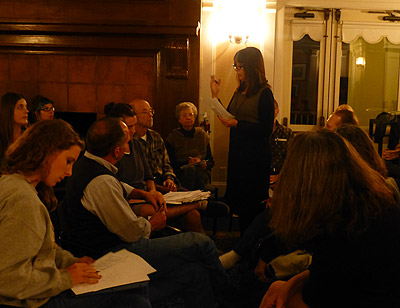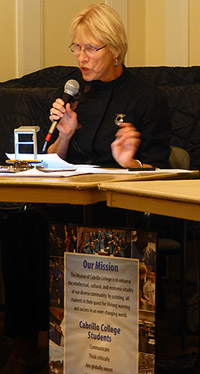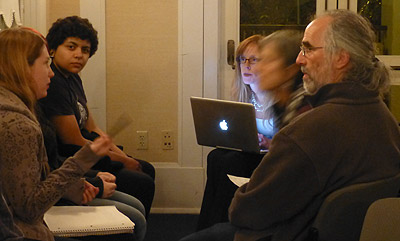What Makes Quality Community College Education?
A Forum with Cabrillo Faculty, Students, and Community Members
By Sadie Reynolds
CCFT and Faculty Senate joined forces this semester to hold a Community Forum entitled “What Makes Quality Community College Education?” On the evening of Tuesday, November 12, we packed the Sesnon House with over eighty attendees, among them Cabrillo students, faculty, and administrators, as well as community members, a representative from Bill Monning’s office, and a reporter with the Santa Cruz Sentinel. The theme of the forum was preserving and promoting resources and access to quality community college education in the current historical context. A panel of experienced Cabrillo College faculty discussed how California arrived at the current historical moment, what they do well in the current climate in terms of providing quality education, and what barriers they face in the coming decade to continuing to do so. Small groups discussed their experiences with accessing educational resources at Cabrillo, and the large group began a collective brainstorm of what it would take to preserve quality and access in the coming decade. 
Michael Mangin, History Instructor and Faculty Senate President, started the panel with a brief historical overview delineating how we arrived at the current moment. Pointing out that the original mission for California Community Colleges was to ensure all Californians had access to free or very low cost public higher education, he touched on how Prop 13 gutted the tax base for public education in the state. Mangin noted several recent trends—the demonization of public employees and teachers’ unions, the commodification of students, and a general retreat from supporting community college education. We now limit the number of units a student can take and the number of times classes can be repeated, with devastating effects on lifelong learners, students in the arts, and basic skills students. In the context of the economic downturn and major statewide budget cuts, Cabrillo (and other community colleges across the state) slashed courses by 15% in the span of a few years. Mangin noted that there are positive aspects of recent legislative changes, e.g., increased assessments, greater emphasis on educational planning, and targeted efforts to meeting student needs. But he pointed out that there are troubling changes afoot as well, such as AB955—a law recently passed that will institute a two-tiered fee schedule that will grant students with greater resources priority enrollment in some classes. Other recent suggestions have been to double the unit rate cost to students and to eliminate the BOG Waiver. Mangin ended by stressing the inestimable value of public education and the importance of communicating that value to the general population. 
The remaining panelists then briefly addressed the unique circumstances of four different student populations affected by current trends. Joseph Carter, English Instructor and Basic Skills & Learning Communities Advisory Council Member, discussed basic skills students. Pointing out that about half of our students fill that designation using assessments measures, he noted that meeting the needs of these students is paramount for the college. Carter noted that the effects of recent changes in repeatability limits are likely to have very negative effects on these learners in terms of discouraging them and making the already thin bottleneck to transfer-level classes even narrower for them, among other unintended consequences.
Robin McFarland, Biology Instructor and Faculty Senate Representative, discussed transfer students. She noted that Cabrillo has highly successful transfer rates to UCs, CSUs, and nationally. Our students are served well by our small class sizes and excellent student services and by the degree to which we are able to provide individualized instruction and interaction with students as faculty. She said that with pressures for efficiency coming from the state, we will need to be audacious and ambitious to hold on to those successes.
Debora Bone, Director of the Stroke & Disability Learning Center and CCFT President, discussed Career Tech (CTE) Students. Commenting on the value of our CTE programs to the community, Bone noted that significant data suggest income increases substantially for graduates of our occupational programs, and the skills that CTE students build, like critical thinking, problem solving, collaboration, and technical skills, are invaluable. Maintaining access continues to get difficult with fewer resources allocated to programs. California has been disinvesting in public education in recent years, said Bone, a trend that needs to be reversed.
Sarah Albertson, Theatre Arts Instructor/Program Chair and CCFT Representative, discussed a group feeling the impact of initiatives for student success and efficiency like no other—lifelong learners. She noted that repeatability limits in VAPA classes have had a chilling effect on this large student population and the entire VAPA Division. Suggesting that creativity is as important as literacy in today’s world, Albertson commented on the need for the community to resist these devastating changes to preserve Cabrillo’s mission.
 During the breakout group portion of the forum, students, faculty, and community members engaged in energized discussions of successes and barriers to accessing quality education at Cabrillo. The forum closed with reports from the breakout groups and a facilitated discussion of what needs to be done promote and preserve quality education at Cabrillo in the coming decade. Students spoke glowingly of their experiences with faculty, programs, and student clubs on campus, and expressed gratitude for the critical thinking, research, and leadership skills that they learned here. But there were significant barriers noted as well. A range of issues around affordability were raised, and many present were profoundly concerned about the prospect of raising fees even more and/or limiting access to resources. Lifelong learning emerged in the large group discussion as a critical component of the life of the college—connecting us with the larger community in important ways and infusing education with passion and creativity. Concerns were raised about large cuts to the Early Childhood Education Program and about career tracking based on ethnic and gender stereotypes. In the words of one participant, “education is not the same as a business model, and we need to be very careful about going too far in the direction of efficiency.”
During the breakout group portion of the forum, students, faculty, and community members engaged in energized discussions of successes and barriers to accessing quality education at Cabrillo. The forum closed with reports from the breakout groups and a facilitated discussion of what needs to be done promote and preserve quality education at Cabrillo in the coming decade. Students spoke glowingly of their experiences with faculty, programs, and student clubs on campus, and expressed gratitude for the critical thinking, research, and leadership skills that they learned here. But there were significant barriers noted as well. A range of issues around affordability were raised, and many present were profoundly concerned about the prospect of raising fees even more and/or limiting access to resources. Lifelong learning emerged in the large group discussion as a critical component of the life of the college—connecting us with the larger community in important ways and infusing education with passion and creativity. Concerns were raised about large cuts to the Early Childhood Education Program and about career tracking based on ethnic and gender stereotypes. In the words of one participant, “education is not the same as a business model, and we need to be very careful about going too far in the direction of efficiency.”
When the only significant complaint with an event of this nature is that there just wasn’t enough time, you know you’ve had success. While the discussion of what needs to be done in the coming decade was cut short due to time constraints at the end of the forum, it was clear that there was consensus among those present that advocacy at the state level was indicated—advocacy to support policies ensuring full access to quality education for all members of our community. And this is where we will pick up the conversation next semester, when CCFT Council’s Leadership Team on the Campaign for Quality Education will be at it again. We need to continue to engage each other, our students, and members of the community in critical dialogue about Cabrillo’s mission and priorities and take action to preserve full access to excellent community college education that promotes personal and social well being. I’ll end with a favorite line from panelist Sarah Albertson, “Keep the Community in Community College.”
